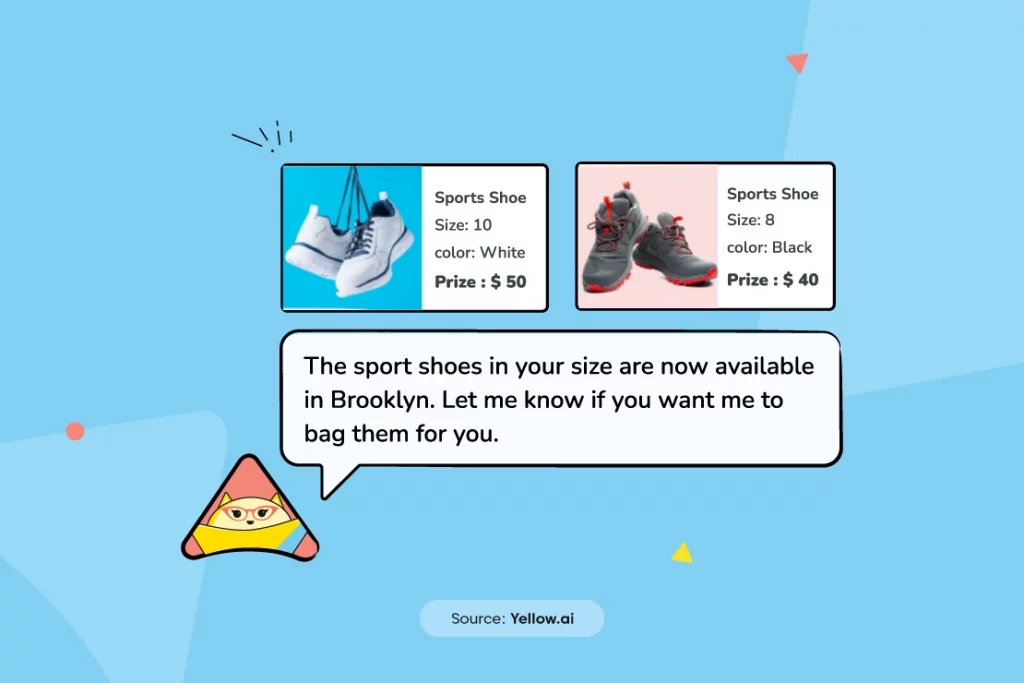While we all have read or heard about the positive impacts of conversational AI in shopping, in this blog let’s understand how businesses can encounter these improvements and recite some of the most popular use cases of artificial intelligence in shopping for retail and e-commerce industries.
Scenario 1: Scrolling through 72 pages with 30 products on each page to find 1 suitable product that matches your choices and preferences.
Scenario 2: Selecting a product out of 10 recommended products based on your requirements and preferences.
Putting ourselves in the shoes of the end consumer, which shopping experience would we prefer?
Most traditional brick-and-mortar stores provide a personal shopping experience by dedicating a human resource to understand the persona, preferences and requirements of the customers before recommending them products and services.
E-commerce and retail platforms can provide a better shopping experience for the customers from the comfort of their homes by using conversational AI in shopping. They can also provide personalized shopping experiences (scenario 2) by deploying AI chatbots to their websites, apps and social media platforms.
Benefits of implementing conversational AI in shopping
In a digitally transformed, fully remote business environment, brands are continuously progressing in delivering the best shopping experience for their customers. They are understanding the marketplace and making changes to their online and offline stores as per customer choices and preferences.
Adding conversational AI can only add to the advancements, further helping end customers with conversational commerce and intelligent customer support. Some of the initial benefits that can be seen by the implementation of conversational AI are listed below.
1. Deliver personalized shopping experiences
Brick and mortar stores offer personal shopping assistants and online stores offer dynamic AI assistants. Conversational AI can help the customers skip the time-consuming process of shortlisting the products that meet their needs by offering personalized shopping experiences.
In the experience economy era, customers are ready to pay extra for a better shopping experience and therefore, online retail stores and e-commerce platforms should cover the extra mile and deliver an experience that their customers deserve.

2. Improve ROI with AI chatbots
Implementing conversational AI can seem to be a difficult task in the beginning. With all the computing and designing of a good AI chatbot, businesses may drop off the plan and move on with their regular virtual store.
However, the end result of conversational AI is nothing but great. A better speed of query resolution, scaled business processes and all this at a much lower cost as compared to human resources doing mundane tasks. Organizations implementing AI in shopping observe a higher ROI and are more likely to prevail in this competitive marketplace.
3. Improve customer satisfaction
Conversational AI can help businesses in providing a no-barrier customer interaction where chatbots and voice bots are available round the clock to support customers and answer their queries. There are no language barriers and businesses can easily engage with customers globally without any obstacles.
When businesses are able to provide customers with responses and answers whenever they need them, customer satisfaction increases and customers become loyal to the business.
4. Enhance employee productivity and efficiency
When most of the simple incoming queries are taken up by AI chatbots, and the mundane and repetitive tasks are automated, human resources are free to take up complex queries and tasks that need human intelligence and effort.
By implementing conversational AI, businesses can keep their employees from being burdened so that they can work efficiently and improve their productivity. Artificial intelligence acts like an additional tool that helps human resources complete their tasks faster and at a larger scale.
5. Boost customer loyalty
When businesses provide exceptional customer experience and thoughtful customer support, customers fall in love with them. They turn into loyal brand ambassadors and advocates for the brand and recommend it to their friends, family and colleagues.
It is easier to retain a loyal customer than to find new customers every day. Therefore, for a business to run successfully and beat the competition, it is very necessary to retain its customers by satisfying them and meeting their needs every time.
Use cases of conversational AI in shopping
Now that we have discussed the benefits of using conversational AI for virtual businesses, it’s time we understand how to approach those benefits.
Below are some of the use cases of conversational AI that can help you become the favorite brand of your customers. Deploying and automating conversations for all these use cases can get you the best results of using artificial intelligence in shopping.
1. Streamline supply chain operations
A number of stakeholders are involved in a supply chain- manufacturers, suppliers, distributors, retailers and customers. There is a huge scope of automation in streamlining the supply chain operations for virtual businesses.
Artificial intelligence can help businesses forecast demands and anticipate the future of the market by providing accurate and enlightening insights. This information can be used to automate supply chain operations by scheduling and planning the production and distribution.
2. Enable product match feature
Gone are the days when customers would scroll through a whole website in search of a product of which they have an image. Artificial intelligence can help them search the product by entering the image as a query.
E-commerce businesses and virtual stores are moving towards helping customers by enabling the product match feature wherein they can search for products using images. Artificial intelligence will read the image using Optical Character Recognition (OCR) and display similar products.

3. Understand customer requirements and preferences
Artificial intelligence and machine learning can provide businesses with a full gist of their customers’ requirements by studying customer data and reviews. It can tell businesses what is liked by customers and what is keeping them from returning to their brand.
The information provided by AI in shopping can be used for multiple purposes like running targeted ads, keeping track of orders and return requests and maintaining inventory based on the insights.
4. Offer personal shopping assistants
Similar to the offline store, customers expect a personal assistant in the virtual store. It is possible when businesses leverage AI and machine learning in shopping. With AI chatbots businesses can learn data about customers such as their past purchases, skin color, the shape of their face, choices in food and even their favorite color.
Using this data AI chatbots can become personal shopping assistants and suggest to customers the products of their choice. It can be very effective and can gain the trust and loyalty of customers.

5. Revolutionize the online store customer experience
Artificial intelligence is not just about using natural language processing or machine learning. It has many other applications such as smart mirror, personal assistant and smart cashier-less payments.
With AI in shopping, businesses can provide the complete in-store shopping experience, just faster and hassle-free. Customers can shop from the comfort of their homes and stay away from long queues and waiting times.
6. Enable smart product search
AI-powered search options are much smarter and faster than normal database searches. It can enable voice and image search options to ease the process of searching for the customers.
With machine learning, millions of products can be sorted and compared within seconds making the search faster and simpler than ever before. Customers can find the exact match simply by uploading an image from their phone or speaking their query in the search bar.
7. Streamline business operations
It takes a lot of hard work and dedication to run an online store and meet customers’ expectations every time they visit your platform. Introducing AI in shopping can only help in streamlining the business operations and help employees work more efficiently and smartly.
With artificial intelligence, businesses can streamline the complete process throughout the sales funnel, right from discovery to customer retention. It can effectively help in understanding the demand and replenishing stocks as per customer requirements.
8. Analyze customer behaviour
AI chatbots deployed in virtual stores can help businesses analyze the sentiments and shopping patterns of their customers. Using AI analytics, businesses can run more customer-centric marketing campaigns and make more informed decisions about stocking the products.
Businesses can forecast the demands and satisfy customers by meeting their demands at the time of need. For example, a pharmaceutical organization using AI can forecast the approximate units of each medicine and stock to fulfill the needs of all its customers.
Future of AI in shopping
The future of retail lies with artificial intelligence. The way businesses research products, price their commodities and manage their inventory will depend on technology and so on the way their customers shop.
According to Facts and Factors, the global Artificial Intelligence Retail Market was estimated at USD 2.7 Billion in 2019 and is expected to hit USD 20.05 Billion by the end of 2026, expanding at a CAGR of 39% between 2020 and 2026.
Conclusion
Our motive is to reach out to retail businesses and help them understand the benefits and use cases of using AI in shopping. We hope we have accomplished this using this blog. In case you are looking to incorporate conversational AI in your virtual shopping platform and provide your customers with a world-class experience, schedule a demo with our experts and enjoy the benefits that come along.

















